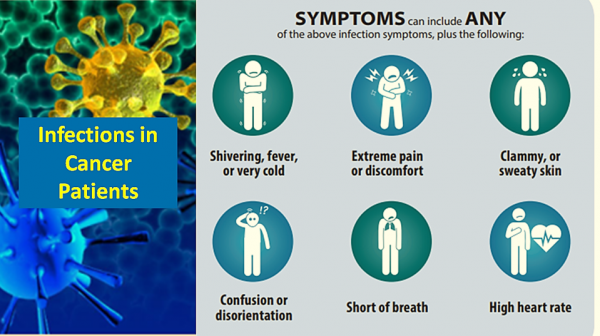
Why infection risk is high in cancer patients
Cancer patients are more vulnerable for infections. Infection risk is high due to their changed, weakened immune system. Immune system which is defense mechanism of the body changes with cancer and cancer treatments. Disease itself and the treatments that a patient undergo weakens the defense system and body will easily get infected when exposed to infectious environment.
Infection is a common complication associated with cancer. Some infections could be fatal and cause more complications. Viruses, bacteria, fungi and parasites are infectious agents that can attack already weakened body.
Reasons for weak immune system in cancer patients are:
- Cancer disease
- Loss of nutrients
- Cancer treatments like chemotherapy
- Medications and or other health conditions
It takes time to get back normal immune system. It depends on the type of cancer, age, treatments, medications, medical problems, food, and environment. Each patient responds to treatment differently and accordingly they recover. Cancer patients who are undergoing the treatment, who finished their treatment need to take precautions to prevent infections from microbial world.
Symptoms of infections in cancer patients:
- Increase in body temperature. Sometimes the fever is early sign of infection.
- Tenderness, redness or swelling in any area of the body
- Pus or discharge in wound or any other part
- Cough and or shortness of breath
- Chill and sweating
- Pain while passing urine
- Abdominal pain
- Vomiting or diarrhea or both
- Sore throat and new sores in mouth
- Stiff neck
- Unusual discharge from vagina or irritation
How to prevent infections in cancer patients?
- Wash hand often using soap and warm water. Wash hands before eating.
- Wash hands after using the bathroom, blowing nose, coughing, or sneezing, after touching trash, animals
- Use moist wipes while handling door handles, wipe keypads and other areas which are used often by other people.
- Use alcohol -based hand sanitizer to clean hands if water is not available when you go out
- Remember that people who are suffering from flu, common fever, cold and other types of infection must stay away from cancer patients
- In this pandemic, wear mask around people, keep social distancing and as much as possible avoid public gatherings.
- Wear sweater, gloves, and masks when necessary.
- Brush teeth twice, focus on oral hygiene. Do not use alcohol- based mouthwash.
- Take shower/bathe every day. Wash private parts properly, wash feet, nails, armpits and sweat areas. Use soft moist or baby wipes to clean anal and groin area.
- Talk to doctor about vaccination to prevent pneumonia, Hepatitis B and flu.
- If your doctor has told that you have weakened immune system, then stay away from young children and avoid visitors to stay away from respiratory infections.
- If you notice redness, swelling, bleeding in any parts of the body immediately inform your doctor.
- Do not get pedicure or manicure from outside. Clean your finger and toenails at home itself using proper tool.
- Avoid using public pools, public tub, and water parks.
- Wear shoes or slippers at home and outdoors to keep germs off. Keep separate footwear to use at home.
- If you get any cuts and wounds, clean and protect the wound using clean bandage. If you notice puss or infection, inform your doctor.
- Do not clean after your pet. Do not touch litter boxes. Seek someone’s help or assign someone to do the task.
- Drink water to help digestive system. If you are constipated drinking warm water should help. Do not use suppositories, enemas. Ask your doctor for bowel softener medicine if the constipation problem continues.
- Do not share your clothes, combs, brush, soap, towel, or personal items with anyone.
- Before planning a trip, consult your doctor and seek advice.
- Eat healthy and recommended food that help to build your immune system. Wash fruits and vegetables or any such raw foods before eating to avoid germs entering your system.
It is good idea to keep a thermometer at home. Have your doctor’s and other important contact numbers handy. Know which medications you should be taking if you have fever or develop infection. Take prescribed medications on time. If you have any infection systems call your doctor immediately.
References:
Read more about cancer infections here; https://www.cdc.gov/sepsis/pdfs/cancer-infection-and-sepsis-fact-sheet.pdf
Image credit: www.cdc.gov (cc by 0)
Author: Sumana Rao | Posted on: February 4, 2021
« Mucormycosis Fungal Infection in Covid-19 Patients Why smokers are more vulnerable to Covid-19 »






















Write a comment